This Week in Games
Little Nightmares 3 Preview, and Digimon Stories: Time Stranger Interview
by Jean-Karlo Lemus,
Welcome back, folks! I've been ruminating on my recent review of Story of Seasons: Grand Bazaar. I mean what I said, but I worry if I might've been too harsh on the game. I feel like having to play a game like Grand Bazaar for review does it a disservice, because the nature of playing a game for review (where you're hurriedly trying to take in as much as you can, as quickly as you can) goes against the spirit of how the game is supposed to be played—leisurely. I don't regret my time playing it, and I look forward to working on any Story of Seasons and Rune Factory titles. But I'm still thinking if there isn't a better way to discuss them critically...
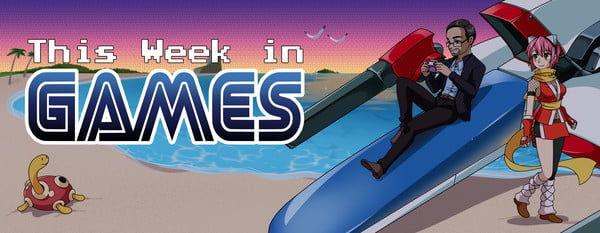
No, Nintendo Didn't Patent Monster-Taming RPGs.
Oy. If I drank spirits, I'd be hankering for one right about now.
Nintendo and Pokémon have really become a "bitch eating crackers" for online gaming discussion. The phrase "anti-consumer" gets thrown around like it's going out of fashion when referencing Nintendo. You'd think it's in reference to, say, Nintendo's history of poor treatment of their contract workers. You'd think it's because of Nintendo having rather-unceremoniously firing longtime voice talent beloved by the fanbase for their portrayal of certain fan-favorite characters. You'd think it's because Nintendo has been complicit in war crimes, like Microsoft. But no, folks are mad about US$450 consoles and industry-standard EULA terms. It's become really easy for people to stoke outrage over half-truths about Nintendo (yes, Nintendo can block your console if they detect you're hacking—no, they can't brick your console). It's just easy to be mad at Nintendo. And why not? They're the most established of the establishment, the company whose name is synonymous with "video games." They're as defensive of their IP as Disney is.
So, of course, the hornet's nest got kicked again this week with news regarding Nintendo. With some people still upset over Nintendo's ongoing suit against Pocket Pair and the alleged patent infringements in Pocket Pair's Palworld, Nintendo filed a new game patent. "How can Nintendo even patent something that vague?" people ask. Much of the reporting (like in the included link) describes it as a patent for "summoning a character and letting it fight another"—but when you read the actual patent document, which is publicly available...

... you realize: the patent is for Pokéballs. The entire patent hinges on "a spherical object" being used for the whole thing. So Nintendo is patenting the iconic brand-established thing that is central to Pokémon, not the battle system at large. That's how the patent is granted and defended. That's why it went through. Further reading solidifies matters even more; the patent isn't even describing a vague expanse of the concept of summoning parties for battle, it's specifically patenting how battles worked... in Pokémon Scarlet/Violet. This isn't even how the newest upcoming Pokémon battle system works (because of course nobody is going to try and patent turn-based or real-time-based battle systems). It's how the Let's Go mechanic in Scarlet/Violet worked.
It's easy to understand how this kind of thing gets overlooked; patents are complicated documents, and most people only read the abstract. But come on. You have people convinced Nintendo is trying to squat on an entire genre mere weeks away from Digimon Story: Time Stranger releasing. I'm quite sure Bandai Namco would be very concerned if Nintendo were somehow doing something that put one of their franchises in peril, especially since the previous Digimon Story titles are available on the Switch. Heck, for all that people have pointed out that Dragon Quest pre-dates Pokémon, Square Enix not making moves against Nintendo hasn't made anyone think "Oh, maybe this doesn't actually affect nearly as many people as we think." Shin Megami Tensei doesn't use Demon Magatama. Digimon doesn't use DigiOrbs. Palworld went and used Pal Spheres, but I'm sure that's just Nintendo being jelly, not a company being protective of a major brand-image. In other news, put a golden arch over the logo of your fast food restaurant, I'm sure the results will be hilarious.
It's not even that I think patenting game mechanics is good. They're not! But considering Sega's patents associated with Virtua Racer and Crazy Taxi (not to mention their own successful patent-based lawsuit from just last year), it bewilders me to see people hold up Sega as a morally-superior alternative to Nintendo. Heck, Bandai Namco alone has far more patents than Nintendo, including a brand-spanking patent filed on August 1 for "stor[ing] match information including types of characters used in a match and a match result of the match for each match." Bandai Namco owns a patent for protecting the player character from another character. Of course, the documentation goes further in-depth about this; Bandai Namco doesn't own server storage methods for match data in general, nor do they own the Defend command in games.
I said this once before when the Palworld lawsuit started, I'm going to say it again: if we want to talk about patents hindering games, we need to talk about it as an industry-wide practice, not just because we're mad at Nintendo. Because Nintendo isn't the only gaming studio in Japan, and talking about Nintendo's business practices in a vacuum is damn near journalistic malpractice—and not because Nintendo can do no wrong.
Half the time, it feels like people want to look for crap to be mad about. What a miserable way to live your life.
Little Nightmares III Preview
So, full disclosure: the Little Nightmares series is one that I mostly know of second-hand. If it weren't for my favorite VTuber being totally obsessed with them and having streamed both games, I wouldn't really know much of them. So mark that as another win for VTubers: exposing you to games you normally wouldn't have played. With that said, Little Nightmares has a strong fanbase thanks to its strong aesthetic: a dark, dream-like world where tiny children scamper around and try to escape from ghoulish adults that relentlessly chase after them. There's a lot of overlap between the Little Nightmares crowd and the folks who really love Coraline. Bandai Namco was nice enough to invite us over to preview Little Nightmares 3.
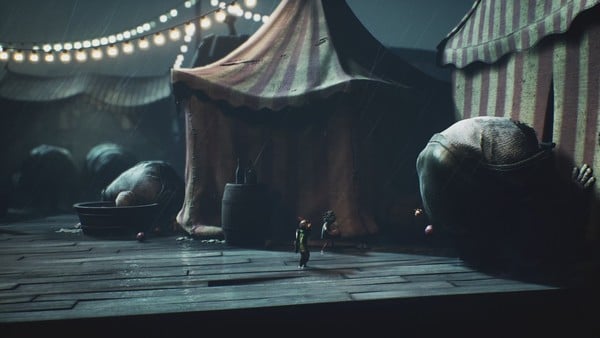
Understandably, there's a bit of consternation over Little Nightmares 3; Tarsier Studios created the series, while Supermassive Games is producing the new game. The good news is that Supermassive also has some of the original dev team working with them, so the spirit of the game is maintained. The wordless turmoil expressed by the child protagonists remains. This is important, given the new twist behind the game: co-op. Little Nightmares 3 has you playing as two children, Low and Alone. While Little Nightmares 2 experimented with having two children to take care of, this new title fully commits to the two children having to help each other to escape a nightmarish circus. Both characters complement each other. On the surface level, there are their weapons: one has a ranged attack with a bow and arrows, and the other attacks up close with a wrench. But many of the puzzles are designed with cooperation in mind, requiring both kids to work together. An early example includes early puppet enemies, requiring Low to use his bow to knock their heads off, while Alone uses her wrench to finish them off by destroying their heads.
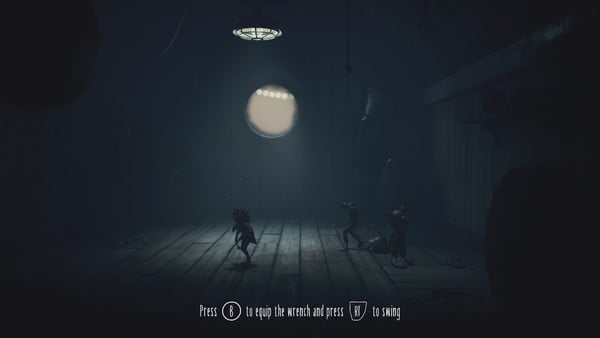
Players will also need to help each other in more granular ways, like giving each other a boost to reach high ledges, working together to push or pull heavy crates, or operating levers in sequence to progress. It's a cute system, and much of the game is designed around the asynchronous nature of it all, especially if completing a puzzle requires the two kids to be apart for a stretch of time. Understandably, readers might have concerns about how this will shake out if you're playing alone. We were assured that the game's internal (non-generative) AI would automatically direct the unused character to landmarks to assist with puzzles. Our preview was with another player, so we weren't given an opportunity to see how that works in practice. Just as well, the early segment gave us plenty of head-scratchers that we had to collaborate to solve. One noteworthy puzzle required both of us to collaborate to escape a freakish old man and his sentient detachable hand-puppet.
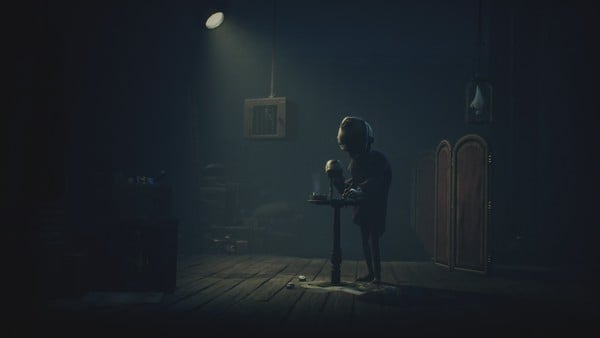
Of course, this also meant that we both had to be in sync when it came to running away from enemies. Plenty of sequences required us to sneak around to progress, watching the behavior patterns of enemies to escape detection. There were, nevertheless, many Keystone Kops-esque shenanigans as one of us would move too early or too late, or get stuck on level geometry, or forget a necessary task in the sequence of events. Of course, it was all taken in stride. I worry about how these sequences will work with a computer controlling the partner, when you don't have another player you can bounce off of.
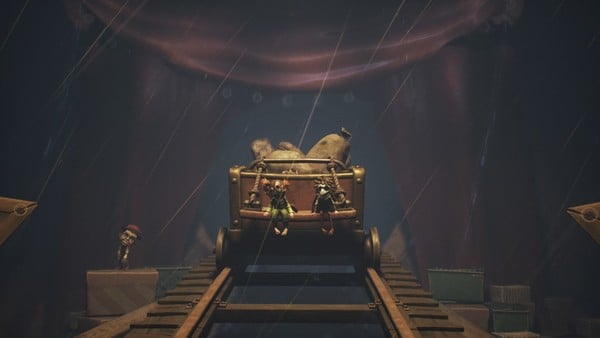
As a credit to Little Nightmares 3, my partner and I were hooting and hollering all the way through the final sequence, which we only failed at the last minute. It was nevertheless a fun time, and it only offered a glimpse at the dark, moody storytelling that you expect from Little Nightmares. So players (and streamers) everywhere can look forward to Little Nightmares 3 this October 10 on Steam, PS4, PS5, Nintendo Switch, Nintendo Switch 2, Xbox One, and Xbox Series X|S.
Interview with Digimon Story: Time Stranger's Producer, Ryōsuke Hara
As my longtime readers will know, I love Digimon, from its origins as virtual pets to the many bizarre directions its video games have taken. When Bandai Namco allowed us to preview the upcoming Digimon Story: Time Stranger, I grabbed my Digital Monster Pendulum Color pet (a Virus Busters-type) and flew off to Seattle for the opportunity. Partway through my play session, I was tapped on my shoulder and given a chance to speak with the producer of the game: the well-dressed Ryōsuke Hara. He was nice enough to answer a few of our burning questions about both Time Stranger and where it'll fit in with the larger Digimon world.
Ryōsuke Hara: (Pointing at the virtual pet) Do the batteries still work?
Anime News Network: No, this is one of the newer reissues that came out earlier this year. Anyway, fans felt a little disappointed with older Digimon projects. There's a lot of fan excitement revolving around Time Stranger. What has Bandai learned from older projects like Digimon Survive or [Digimon Story: Cyber Sleuth]?
RH: What parts did people complain about for the other titles?
ANN: It ties into my next question a little because it feels like Digimon mostly revolves around (the anime) Digimon Adventure, to the exclusion of other parts of the Digimon world. That, and it felt like there was a lack of promotion for Survive.
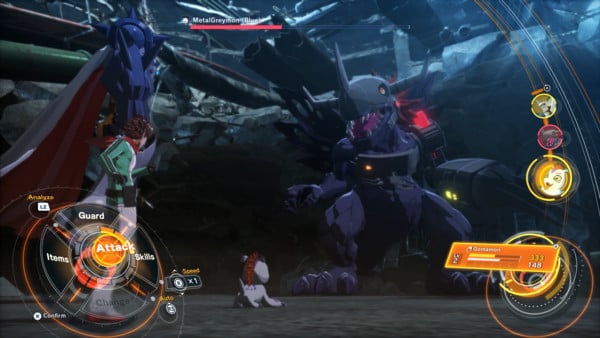
RH: [With regards to the older games], I wasn't involved in those projects, but I'm sure they had budgetary and time restraints, and obviously Digimon Adventure is how a lot of people discovered Digimon. Naturally, the Digimon that showed up in the show were the more popular ones. So we had to recycle them over and over again. It's like we almost had no choice. However, this title is not Digimon Adventure-related at all: it focuses on the Olympos XII Digimon, a somewhat-popular and almost prestigious group of Digimon that had never really been tapped into in the past. That's how we decided on the theme for this title. What opened up the floodgates was Cyber Sleuth, which was very popular worldwide. That opened Bandai Namco's eyes about Digimon, and allowed them to widen the scope of the Digimon franchise [with regards to its games]. There are more Digimon that haven't been tapped into in the past. They were also able to increase the resources and time they had to work on this game.
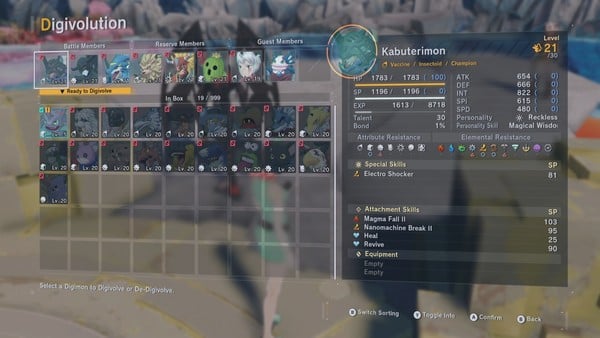
ANN: By that same token, are there concerns about how potential fans that aren't very familiar with Digimon might react to Time Stranger? Because outside of the games, Digimon is a very wide franchise where the anime does one thing, but then the light novels do their own thing, and the games are practically their own entire universe. Were there concerns about newcomers being confused? How do you communicate what it is that makes the Digimon universe what it is?
RH: That's definitely something we thought about. That being said, when the game starts, the main character doesn't know what a Digimon is, either. That allows us to explain to a new player what a Digimon is. It helps ease new players into things.
ANN: Coming into [Time Stranger], the thing that stands out to me more than anything else are the quality-of-life features: the ability to change the speed of battles, the fluidity with which you can approach battles, the pre-emptive attacks, being able to raise and lower a Digimon's stage... what kind of data did you have that led you to focus on these mechanics?
RH: We didn't just want to go all-in on making a Digimon game; we wanted to make a really good RPG. What does a good RPG consist of? It could be a good story, a good battle system, good graphics, quality-of-life stuff perhaps? I think the better quality-of-life options make it a better experience for the players.
ANN: If you wanted to make an elevator pitch for Time Stranger, how would you describe it to people?
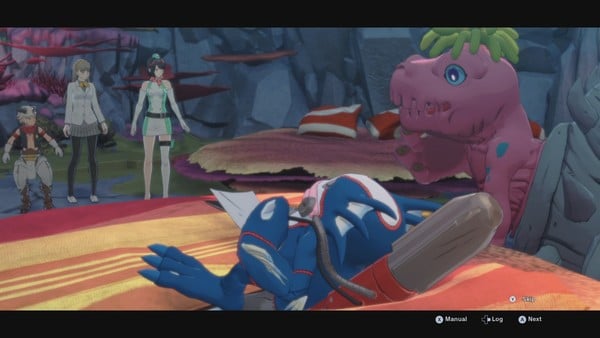
RH: An overarching theme with all Digimon properties is the bond between Digimon and humans. That's something we really wanted to accentuate with this title. By the time you beat the game, we hope that the player can experience a monster-taming RPG that is unique in a way that only Digimon is able to do.
Many thanks to Hara-san for taking the time to answer our questions, and many thanks to Bandai Namco for arranging the interview for us!
Let's wrap up with some quick tidbits
That'll do it for this week. By the time you read this, Nintendo will have streamed an hour-long Direct. Understandably, that would not give me enough time to actually include any of it in this week's column; we'll discuss the matters at length next week. In the meantime, I might actually be looking forward to Autumn. I've been trying to read Heaven Official's Blessing in my off-hours. I similarly encourage you all to find something non-screen-related to try; this is your sign to pick up that book you've been putting off. Be good to each other. I'll see you in seven.
This Week In Games! is written from idyllic Portland by Jean-Karlo Lemus. When not collaborating with Anime News Network, Jean-Karlo can be found playing Japanese RPGs, eating popcorn, watching v-tubers, and tokusatsu. You can keep up with him at @ventcard.bsky.social.
discuss this in the forum (3 posts) |